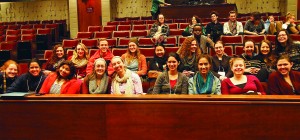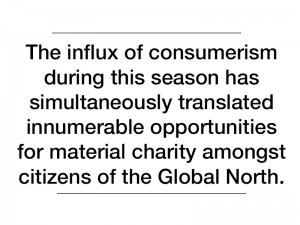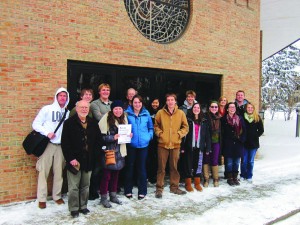With the new changes brought to SGA this fall, positions entail different responsibilities. Senior, Katharine Labrecque, serves as this year’s president, heading up the newly organized student government.
Labrecque has been involved in student government since her freshman year in high school. She served as secretary for four years and continued that role her first and sophomore year at Houghton for the class of 2015. Last year, she served as a senator for the political science department. This year she begins a different role, as president.
“There are a lot more responsibilities. It’s hard because I am overseeing the different officers, making sure they are carrying out their roles while also being supportive,” said Labrecque regarding the transition, “I like having a clear goal in mind and to write notes. But I do carry that into this role, I still take notes. And just being organized… that has been a strength.”
Her role is to oversee all of the executive council and to represent the student body: their needs and their voice. One of her biggest objectives is to make herself available to receive feedback from students.
“Whether that is from personal interaction with students in my classes or on the soccer team, a suggestion box, or just having people come in the office,” said Labrecque, “I think [my role is] just about the students and I don’t think that I am any more important than they are, but I am a way that they can get their voice heard to faculty, staff and to people who are in charge of the college.”
Through the reorganization of the cabinets, there are less members total. Without senators, the power of SGA is much more concentrated. Due to having a fewer amount of representatives, Labrecque has encouraged members to seek student input.
“It’s a whole new system set up and we are working on our constitution and bylaws and making sure that they align with the college policies,” said Labrecque, “A huge focus now is on the non-traditional students, in Buffalo, and what role we can have there.”
As a dual Political Science and International Development major, Labrecque’s interests of studies converge in her role. Although not knowing where she will end up, she knows how she has been called to act. Her involvement with SGA at Houghton is in line with her goals to prepare for the future.
“I definitely feel like God has put on my heart that I need to be a voice for people who are not heard,” said Labrecque, “And I feel that whatever it is, whether it is politics, which I am interested in, or for government agencies, specifically in development or public policy, that I can really advocate the people and make it about the people.”
Currently, Labrecque is lending her voice to Houghton students. Yet, beyond the population of Houghton, Labrecque is concerned with justice and advocacy on a broader scale.
“I feel like our politics, in the US, are very much separate, there is a lack of unity,” said Labrecque, “It has been frustrating to see that people are suffering because we can’t get along and we can’t make trade-offs.”
Labrecque’s passion to serve has allowed her to take on many roles. As president, Labrecque launches SGA into a new year structured by new organization. Perhaps students will respond to her vision of a refurbished SGA, sharing her passion for the voice of the individual, and creating the necessary dialog between the two.
“This is new for me. I want to make SGA something that is not a governing body, but a resource. It can be a way that we can communicate with students and let them know about the things that are going on in the world and on campus, just make it transparent.” said Labrecque, “I think there have been a lot of negative connotations attached to SGA and I want to rid that. I want to make it a place that people associate with this comfortable body of student leaders who are desired and work for the rest of the campus.”
Different ways to connect with Labrecque and other member of SGA include: looking for SGA members around campus, emailing SGA at sga@houghton.edu, sending a comment or sharing feedback through intra-campus mail marked SGA, scheduling a coffee date with the president, or visiting the office in the basement of the Campus Center and leaving a prayer request.




